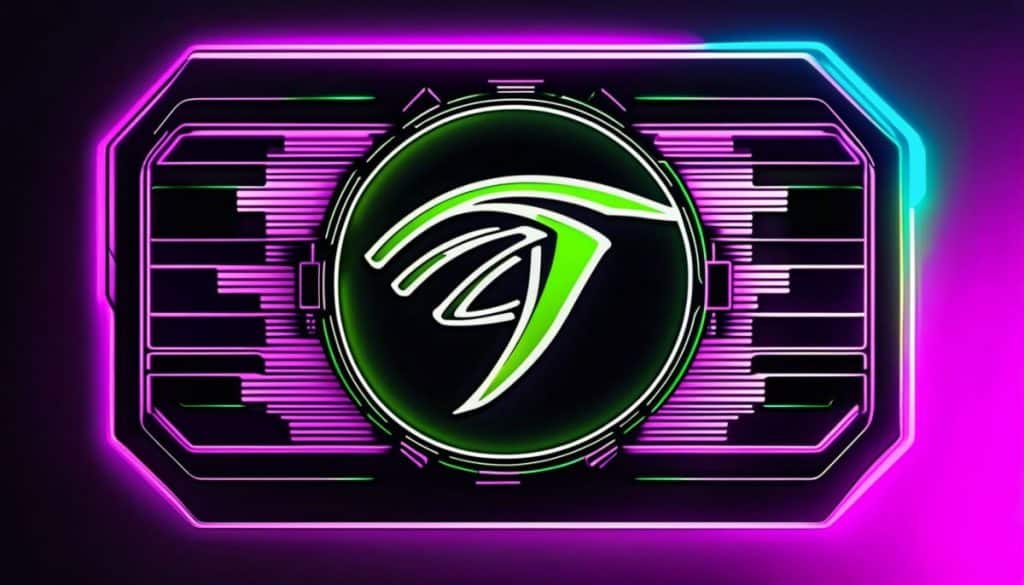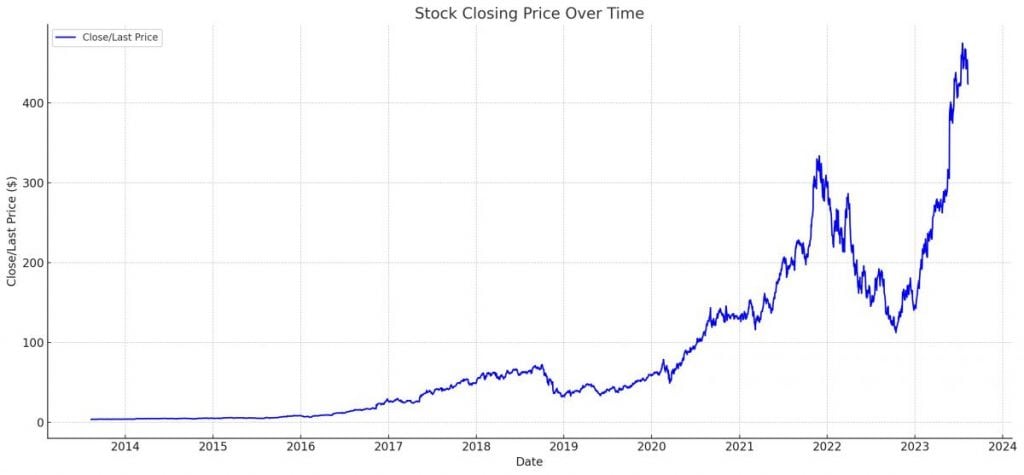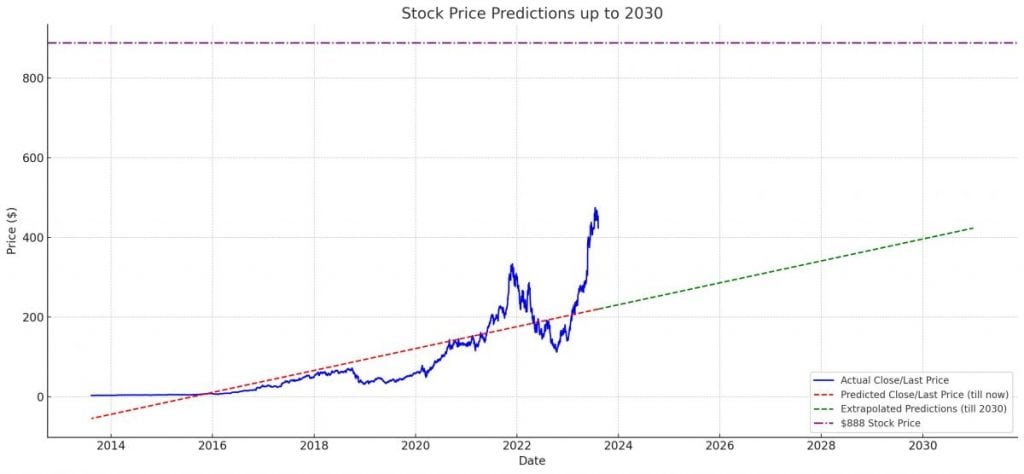5 Insights on Nvidia's Path to a $2 Trillion Market Cap by 2030
In Brief
Nvidia, the first chipmaker to achieve a $1 trillion market valuation, has undergone impressive expansion between the fiscal years of 2013 and 2023.
Experts predict that Nvidia's revenue and adjusted earnings per share (EPS) will skyrocket by 58% and 34% this year, prompting a rush of investors returning to its shares.
Should Nvidia maintain its current valuation and manage to double its revenue and earnings once more, it could realize a staggering $2 trillion market cap by the year 2030.
Nvidia made headlines as the first chip manufacturer to attain a market capitalization of $1 trillion and has experienced significant growth over the period from fiscal 2013 to 2023. This growth saw revenue and adjusted net income increasing at a compound annual growth rate (CAGR) of 20% and 28%, largely fueled by the PC gaming and professional visualization sectors. Nonetheless, the pandemic and a shift towards cloud-based services led to a drop in revenue from gaming. In fiscal year 2023, Nvidia's revenue remained stagnant, with adjusted EPS falling by 25%. Yet analysts are optimistic, forecasting that revenue and adjusted EPS will bounce back significantly this year. If Nvidia can keep its valuations stable and succeed in doubling its revenue and profits once again, it stands a chance to attain a market cap of $2 trillion. $1 trillion At present, Nvidia commands a high price, trading at 218 times its trailing earnings and 37 times last year's sales. Should its growth decelerate to a 10% CAGR over the forthcoming seven years, its valuations could see a drastic reduction, suggesting that its market value might hover around $1 trillion by the end of the decade. $2 trillion market cap by 2030 . However, Nvidia’s stock By 2030, Nvidia is on track to reach a remarkable milestone with a market capitalization of $2 trillion. A multitude of factors, particularly the robust demand from prominent tech corporations in China for Nvidia chips, will play a critical role in achieving this feat. The procurement of these chips not only boosts Nvidia's revenue but also solidifies its standing as the leading provider of advanced computing solutions globally. This strategic partnership will enable Nvidia to extend its reach and establish a significant presence in China's fast-evolving tech landscape.

1. Major Orders from Leading Chinese Technology Firms
In a notable move, four prominent Chinese technology companies—Baidu, ByteDance, Tencent, and Alibaba—collaboratively placed an impressive order worth $1 billion. This significant order included nearly 100,000 Nvidia A800 chips, scheduled for delivery by year-end. Looking ahead, these firms have also arranged another order worth $4 billion for delivery in 2024. Such substantial orders from these Chinese tech giants signal their strong demand for the high-performance Nvidia A800 chips and underline their commitment to remaining at the forefront of technological advancements while anticipating future growth within the sector.
With the rising importance of Artificial Intelligence in contemporary applications, there has been a notable spike in demand for powerful chips. Nvidia chips, such as the A800, have become vital in the development of advanced AI models. The sheer volume of the order reflects the critical role these chips play in the evolution of AI technology. Specially engineered to perform complex calculations and expedite AI algorithms, they are essential for training deep learning models. As China’s technology leaders pour resources into AI research and development, the appetite for Nvidia chips is set to continue on an upward trajectory in the coming years.
2. Essential Role of Nvidia Chips in AI
A significant concern for international businesses is the looming possibility of a new US export ban. This anxiety has significantly influenced the decision of Chinese firms to acquire Nvidia chips in substantial quantities, ensuring their AI progress remains unaffected by geopolitical shifts. Various Asian companies are well aware of the crucial role of Nvidia chips in furthering their AI developments and are taking proactive steps to maintain their momentum. By stockpiling these crucial chips, they aim to safeguard their projects from any potential disruption stemming from the uncertain landscape of US export regulations and ensure their technological advancements continue smoothly. China’s tech giants The A800 variant is essentially a refined version of the A100 model. Although it has a lower data rate compared to its predecessor, the A800’s demand remains robust due to the shortage of the A100. Customers depend on the A800 for its dependable performance and value for money, even with its reduced data capabilities. Additionally, its compatibility with existing systems makes it a practical option for businesses in search of reliable solutions.
3. Potential Export Restrictions
5. Reliance on Nvidia for Large Language Model Training
4. Features of the Nvidia A800
Organizations working at the pinnacle of AI innovation heavily rely on advanced chips for the training of their models. Without Nvidia’s cutting-edge technology, firms would struggle significantly in their capacity to develop these sophisticated models. Nvidia’s GPUs stand out for their ability to offer the phenomenal computational power required for training large language models. Designed to tackle complex calculations, these GPUs empower companies to execute model training more efficiently and swiftly. Without access to Nvidia’s innovations, many organizations would encounter substantial hurdles in unlocking the complete potential of large language models and pushing forward AI research.
NVIDIA Corporation (NVDA): Stock price forecast for 2030 under the condition of reaching a $2 trillion market cap, with a price target of $888.
Large Language Models ( LLMs NVIDIA Corporation (NVDA) : Current market cap of $1 trillion with a stock price of $410.


McKinsey: AI is projected to generate an incredible $4.4 trillion in annual economic impact. OpenAI, the creator of ChatGPT, is in talks with investors and is valued at $29 billion. Microsoft has hit a record valuation of $2.6 trillion, buoyed by its promising AI prospects.
Read more about AI:
Disclaimer
In line with the Trust Project guidelines Addressing DeFi Disparity: How Omniston Enhances Liquidity on TON







